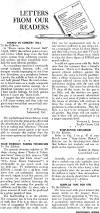|
July 1969 Electronics World
 Table of Contents
Table of Contents
Wax nostalgic about and learn from the history of early electronics. See articles
from
Electronics World, published May 1959
- December 1971. All copyrights hereby acknowledged.
|
Would you work a 44-hour week for
$127 (less after taxes are pulled out)? That's $6,600 per year, or $2.89 per hour for
a highly skilled electronics technician in 1969. According to the U.S. Bureau of Labor
Statistics' Inflation Calculator, the equivalent pay in 2017 would be
$45,703.89 per year, or $19.98 per hour. A quick look at the
current pay rate for an E4 (Sr. Airman, ~3 years of training and service) pay grade in
the USAF
is $2,139 per month ($25,668 per year). That does not factor in free housing, meals,
and medical care (including for all dependents) - which has significant value.
GlassDoor reports the average salary for an electronics technician
in 2017 was $42,390. That amount is actually a bit lower than the 1969 average. Assuming
the present day average is for a 40-hour week ($20.38 per hour), then adding another
4 hours of overtime at a x1.5 rate per labor law increases the total by $122.28 per week
($6,358.50 more per year), That makes an adjusted grand total average of $48,749
per year, which is a tad more than the 1969 average. Since these are all averages without
standard deviations or even knowledge of the method and/or agenda (if any) of the reporter, it
is probably safe to conclude that electronics technicians make today approximately what
they made in 1969.
Your Friendly, Fading Technician
 Where Do You Find Technicians?
Where Do You Find Technicians?
That's the question most electronics-service-industry leaders are asking. new blood
is hard to attract and harder to hold. Just as important is how to make present technicians
more able and efficient. The answers take several directions.
The Electronic Industries Association is concentrating right now on vocational instructors
and guidance counselors. Better instructors of servicing can stimulate more interest
among students and turn out graduates better qualified to repair home electronics gear.
And guidance counselors can influence students considering electronic careers. School
systems can find out about this program for vocational instructors from EIA, 2001 Eye
St., Washington, D.C. 20006.
National Electronic Associations is putting its effort into an improved apprentice
program. New NEA director of apprenticeship is Charles Cave, 7902 Bardstown Rd., Louisville,
Ky. 40291. He initiated the Louisville plan (this column, October 1968, page 6) whereby
public-school vocational students go to class half- days and work in local shops half-
days (for pay). The plan is so successful, shops are on a waiting list for the next class
to start. With Cave, NEA is helping the Indiana Board of Education set up a similar program
statewide.
 To the Editors:
To the Editors:
The present situation relative to TV shops closing down ("Radio & Television News"
items in Feb. issue on "Old Service Shops Just Fade Away" and "Who Cares About Customers?")
is attributable to too much work and too little pay. TV technicians earning $550.00 a
month for a 44-hour week know they are underpaid. Increasing the work output is not the
answer, for it cannot be increased beyond its prevailing level without lowering the quality
and incurring the penalty of callbacks and the like. In short, only a given amount of
work can be produced in a given period of time.
The handwriting is in the plaster. The consumer has to face the moment of truth that
if he is to obtain the services of competent TV technicians he must pay what they are
really worth.
This can be implemented only by a rate increase sufficient to pay shop owners a reasonable
return for their efforts; and they will, in turn, pay their TV technicians more than
$3.00 per hour, which is what the above figure of $550.00 per month reflects.
I could not agree more with Mr. Belt's view that the customer likes a friendly technician.
This is as it should be. The present climate militates against this however; the scene
is hardly pacifistic. Only a fellow technician can know the outrages suffered almost
daily by other technicians dealing with the rank and file customer. This alone has driven
the TV shop off the scene, for the pay is too little, and the attrition too great. Until
the pay is increased substantially, and a new sense of pride is restored, the forces
of attrition will continue to drive the cream of the TV servicing profession to other
industries. This, Mr. Belt, is a fact to be reckoned with by all parties. Big shops will
not ameliorate it - they will only perpetuate it on a larger corporate level.
Vincent L. Irvan
Pacific Grove, Cal.










